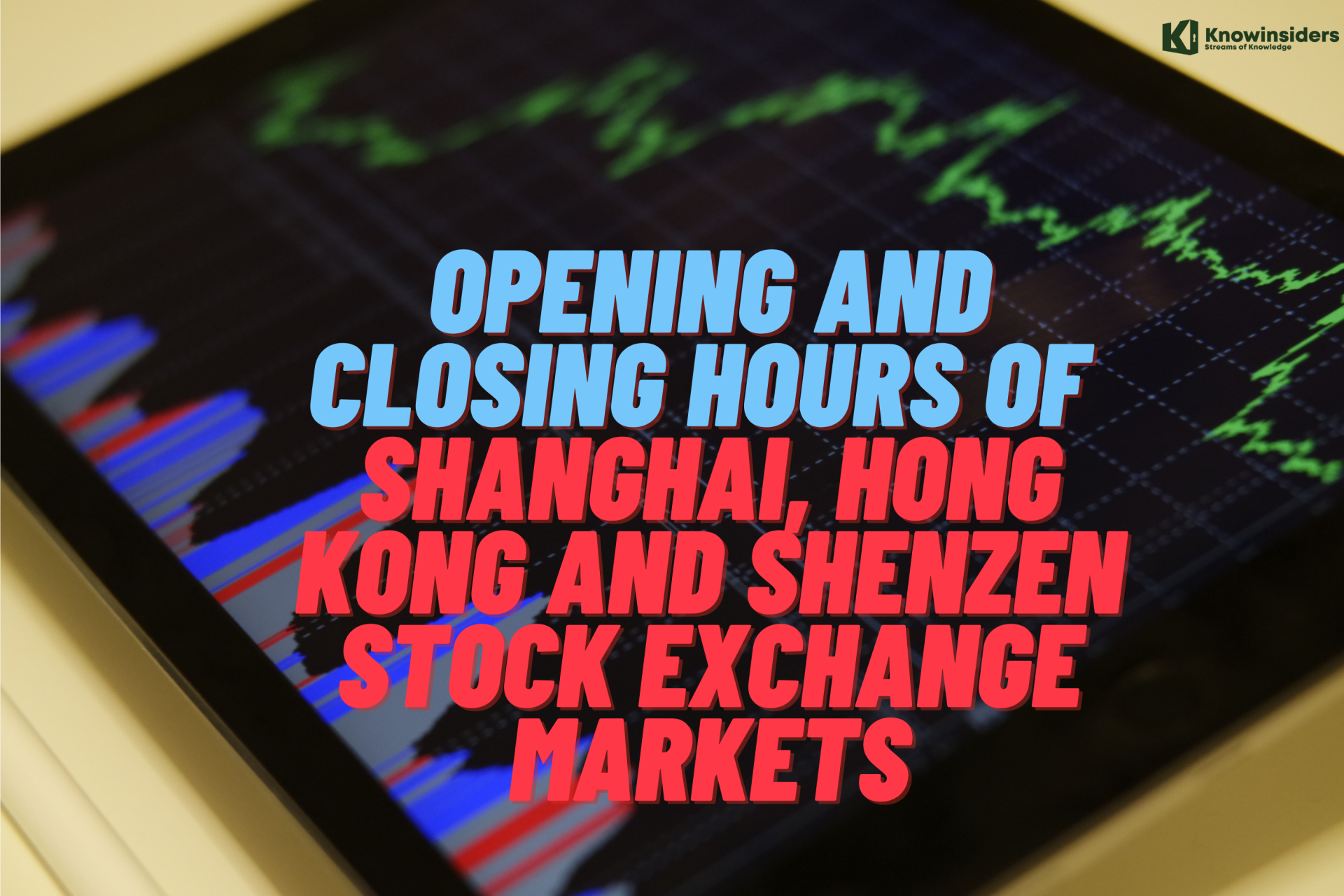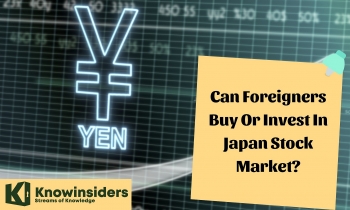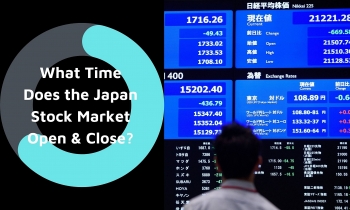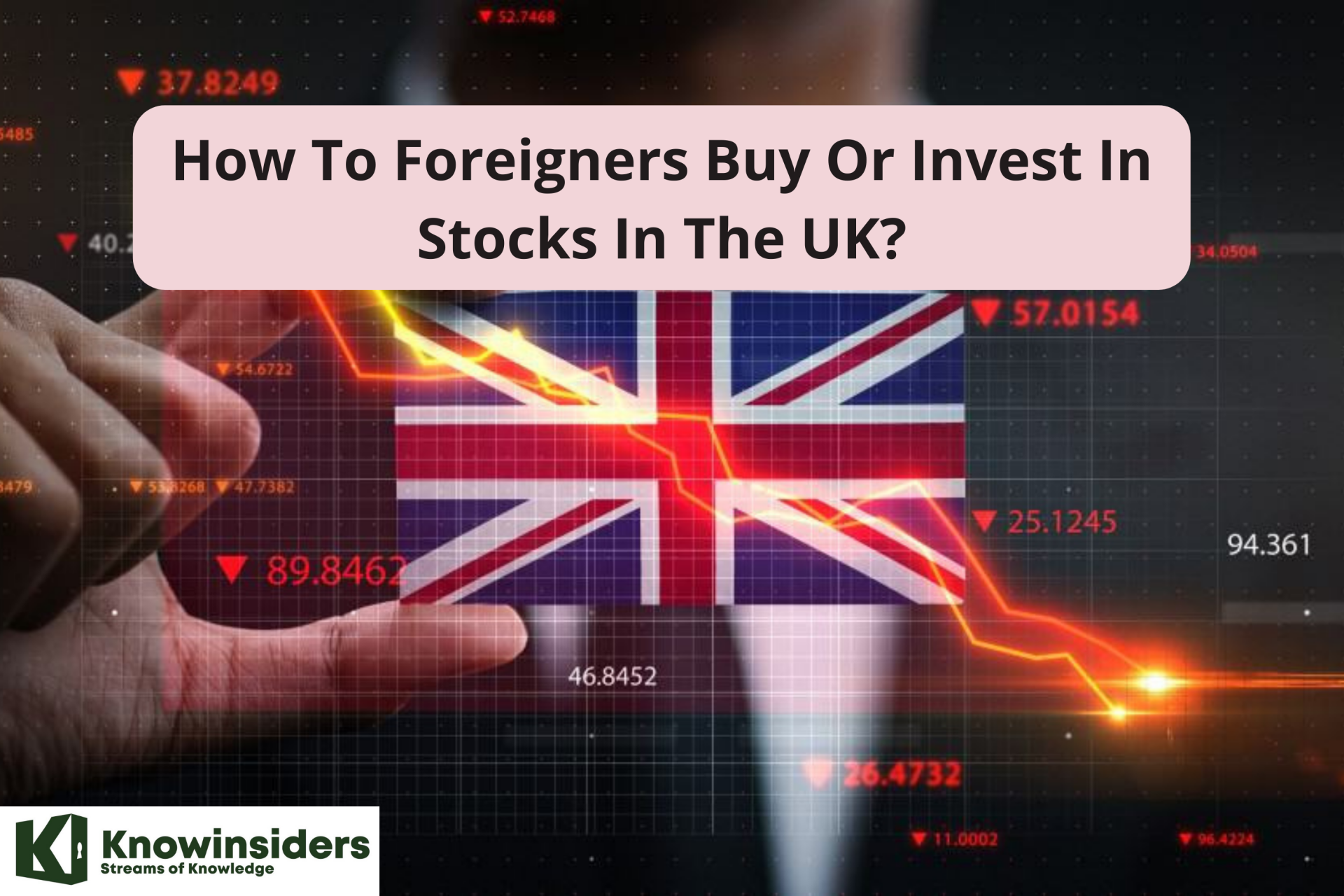What Time Does Chinese Stock Market Open and Close?
 |
| What Time Do Shanghai, Hong Kong and Shenzen Stock Exchange Markets Open and Close? Photo KnowInsiders |
There are altogether 3 stock exchanges in China, the Shanghai stock exchange, the Shenzhen stock exchange, and the Hong Kong stock exchange. Stocks listed in Shanghai and Shenzhen are called A Share, and those listed in Hong Kong are call H Share.
An Overview of Shanghai Stock Exchange
Closed in 1950 after the Communist revolution, the Shanghai Stock Exchange restarts operations in December 1990, cementing the growth and development of capital markets in China.
Since the mid-nineteenth century, Shanghai has been the most important financial center and cosmopolitan city of mainland China. Situated midway down the Pacific Coast at the mouth of the Yangtze River, the port bustled with trade and capital flows. Securities trading in Shanghai went back to the late 1860s, when the shares of local and regional companies were listed in business newspapers. In 1891, American, British and French businessmen founded the Shanghai Stock and Sharebrokers Association, the first stock trading organization in China. In 1904, the Association applied for company registration in Hong Kong and was renamed Shanghai Stock Exchange. Outside brokers formed another Stockbrokers Association in 1909 in Shanghai’s International Settlement. Eventually, the two associations merged and formed the Shanghai Stock Exchange in 1928.
What time does Shanghai Stock Exchange Market open and close?
The Shanghai Stock Exchange is open Monday through Friday from 9:30am to 11:30am and 1:00pm to 3:00pm China Standard Time (GMT+08:00).
An Overview of Hong Kong Stock Exchange Market
The Hong Kong Stock Exchange (HKG) is a wholly-owned subsidiary of the Hong Kong Exchange and Clearing Limited (HKEx) and the leading regulator of issuers in Hong Kong and Mainland China. It is ranked as the third-largest stock market in Asia in terms of the aggregate market capitalization of the listed companies. The Hong Kong Stock Exchange traces its origin to the Association of Stockbrokers in Hong Kong, established in 1891 and renamed in 1914.
The Hong Kong Stock Exchange (HKG) is Asia’s third-largest stock exchange based on market capitalization, trailing only the Tokyo Stock Exchange and the Shanghai Stock Exchange. It is also one of the fastest-growing market exchanges in Asia, with 2,137 listed companies as of 2020, up from 1,200 in 2008.
The combined market capitalization of the listed companies is approximately HK$42,088. The growth has been fueled by the progressive development of the Mainland China market, with more companies from the mainland being listed.
The minimum capitalization for a listing and the minimum value of public float on the Hong Kong Stock Exchange currently stands at HK$500 million and HK$125 million, respectively. The minimum values were raised in 2017 to make trading liquidity for market participants robust and enhance the volatility of listed equities. Banks and insurance firms from Mainland China top the list of all the listed companies on the Hong Kong Stock Exchange.
READ MORE: Can Foreigners Buy Or Invest In UK Stock Market?
What time does Hong Kong Stock Exchange Market open and close?
The Hong Kong Stock Exchange, headquartered in Hong Kong, is open from 9:30 a.m. to 12 p.m. and 1 p.m. to 4 p.m. Hong Kong Time (HKT). It also closes for 17 holidays per year, including New Year’s Day, three days for the Lunar New Year, Qingming Festival, Good Friday, Easter Monday, Labor Day, Dragon Boat Festival, Special Administration Region Establishment Day, three National Days, two days for Christmas and New Years Day.
An Overview of Shenzen Stock Exchange Market
The Shenzhen Stock Exchange (SZSE) is one of two main stock exchanges operating independently in mainland China. The other exchange is the Shanghai Stock Exchange (SSE). The Shenzhen Stock Exchange (SZSE) is a self-regulated legal entity under the supervision of the China Securities Regulatory Commission (CSRC). The main functions of the Shenzhen Stock Exchange (SZSE) are to oversee securities trading, provide the facilities for securities trading, and devise operational rules.
The Shenzhen Stock Exchange (SZSE) was established on Dec. 1, 1990.2 It is located in Shenzhen, a modern city in southeastern China. The skyscraper building where the Shenzhen Stock Exchange (SZSE) is located is in the Futian District. Its construction was started in 2008 and finished in 2013. The building is 806 feet tall and has 49 floors.
What time does Shenzen Stock Exchange Market open and close?
The Shenzhen Stock Exchange (SZSE) is the world's eighth-largest stock exchange by market capitalization, with a market capitalization of $3.90 trillion in July 2021. It has trading sessions four hours a day and five days a week, Monday through Friday from 9:15 a.m. to 11:30 a.m. and 1 p.m. to 3 p.m.3 Its products include A-shares, B-shares, indices, mutual funds, fixed income products, and diversified derivative financial products. Many of the companies listed on the exchange are subsidiaries of companies in which the Chinese government maintains a high level of control.
| Stock Market Hours: Extended-Hours Trading? Investors can trade stocks during the hours before and after the stock market closes. Known as after-hours trading, this allows you to buy or sell stocks after the market closes. On the other hand, pre-market trading happens in the hours before the market opens Together, after-hours and pre-market trading make up extended-hours trading. While investors can trade stocks during weekday mornings and evenings, trading on weekends is not possible. The only exception is if it’s on an international exchange that’s already open in that time zone. For example, the NYSE offers after-hours trading from 7 a.m. to 9:30 a.m. and from 4 p.m. to 8 p.m. The NASDAQ offers pre-market trading from 4 a.m. to 9:30 a.m. and after-hours trading from 4 p.m. to 8 p.m. Depending on the exchange, there may be different rules for after-hours trading than for normal trading hours. In addition, each brokerage firm may have different rules for trading when the market is closed. Most brokerages require customers to agree to the Electronic Communication Network, or ECN, user agreement before engaging in after-hours trading. Sometimes customers are required to discuss it with a representative so that they can understand the potential risks associated with after-hours trading, such as less liquidity and more volatility. ECN electronically matches buyers and sellers to execute limit orders. Sometimes, after-hours orders happen through a dealer at a price that’s better than the ECN’s best offer. At the end of extended-hours, any incomplete orders are canceled. A few brokerage accounts that offer after-hours trading include Merrill Edge, Fidelity and Charles Schwab. |
| Pros and Cons of Extended-Hours Trading For starters, you can trade at any time with after-hours trading. In other words, you can trade when it’s most convenient for you or in response to timely news events. Many public companies release their quarterly earnings after 4 p.m. EST, when the NYSE has closed. Therefore, investors can immediately place a trade after companies release their earning. Under normal circumstances, investors would have to wait until the market opens again. The U.S. employment report releases at 8:30 a.m. EST the first Friday of every month. Rather than waiting until 9:30 a.m., an investor could adjust their position immediately after the report comes out. There is no guarantee your order will go through during outside hours, even if you make the order. The vast majority of trading happens during normal business hours. That means if you are selling stock, there is more demand during normal business hours. If you are buying stock, there is more supply during normal business hours. In addition, price volatility tends to be higher during after-hours trading, and there may be trading limitations imposed by your broker. For example, if you’re a new or inexperienced investor, your brokerage account may not allow for buying specific investments that are exceptionally volatile. However, one of the main potential disadvantages is that buying and selling outside of normal business hours could negatively impact your profitability. For example, if you are trying to sell shares of stock during extended hours, there might not be as many buyers interested in those shares – so you might not be able to get the price you want during extended hours. |
Holidays of three stock exchange markets
| Shanghai Stock Exchange (SSE) Holiday Calendar 2021 | |||
|---|---|---|---|
| New Year's Day | 01 January | ||
| Lunar NY Eve 1 | 11 February | ||
| Lunar New Year 1 | 12 February | ||
| Lunar New Year 4 | 15 February | ||
| Lunar New Year 5 | 16 February | ||
| Lunar New Year 6 | 17 February | ||
| Ching Ming Festival | 05 April | ||
| Labour Day Holiday | 03 May | ||
| Labour Day Holiday 2 | 04 May | ||
| Labour Day Holiday 3 | 05 May | ||
| Dragon Boat Festival (Tuen Ng Day) | 14 June | ||
| Mid-autumn Festival Holiday | 20 September | ||
| Mid-autumn Festival | 21 September | ||
| National Day 1 | 01 October | ||
| National Day 4 | 04 October | ||
| National Day 5 | 05 October | ||
| National Day 6 | 06 October | ||
| National Day 7 | 07 October | ||
| Shenzhen Stock Exchange (SZSE) Holiday Calendar 2021 | |||
| New Year's Day | 01 January | ||
| Lunar NY Eve 1 | 11 February | ||
| Lunar New Year 1 | 12 February | ||
| Lunar New Year 4 | 15 February | ||
| Lunar New Year 5 | 16 February | ||
| Lunar New Year 6 | 17 February | ||
| Ching Ming Festival | 05 April | ||
| Labour Day Holiday | 03 May | ||
| Labour Day Holiday 2 | 04 May | ||
| Labour Day Holiday 3 | 05 May | ||
| Dragon Boat Festival (Tuen Ng Day) | 14 June | ||
| Mid-autumn Festival Holiday | 20 September | ||
| Mid-autumn Festival* | 21 September | ||
| National Day 1 | 01 October | ||
| National Day 4 | 04 October | ||
| National Day 5 | 05 October | ||
| National Day 6 | 06 October | ||
| National Day 7 | 07 October | ||
| Hong Kong Stock Exchange (HKEX) Holiday Calendar 2021 | |||
| New Year's Day | 01 January | ||
| Lunar New Year 1 | 12 February | ||
| Lunar New Year 4 | 15 February | ||
| Good Friday | 02 April | ||
| Easter Monday | 05 April | ||
| Ching Ming Festival | 06 April | ||
| Buddha's Birthday | 19 May | ||
| Tuen Ng Day | 14 June | ||
| SAR Establishment Day | 01 July | ||
| Day Following Mid-autumn Festival | 22 September | ||
| Chinese National Day | 01 October | ||
| Chung Yeung Day | 14 October | ||
| Christmas Holiday OBS | 27 December | ||
 Can Foreigners Buy Or Invest In Japan Stock Market? Can Foreigners Buy Or Invest In Japan Stock Market? How to buy (invest in) stocks in Japan for overseas residents? Check out the guidelines and tips for investing the Japan Stock Market for foreigners! |
 What Time Does the Japan Stock Market Open & Close? What Time Does the Japan Stock Market Open & Close? When does the Japan stock market (Tokyo Stock Exchange) open or close? Check out the information below for more about the opening & closing hours, ... |
 Can Foreigners Buy Or Invest In UK Stock Market? Can Foreigners Buy Or Invest In UK Stock Market? How to buy (invest in) stocks in the UK for non-UK residents? Read on to know the guidelines and tips for investing the stocks for ... |



























